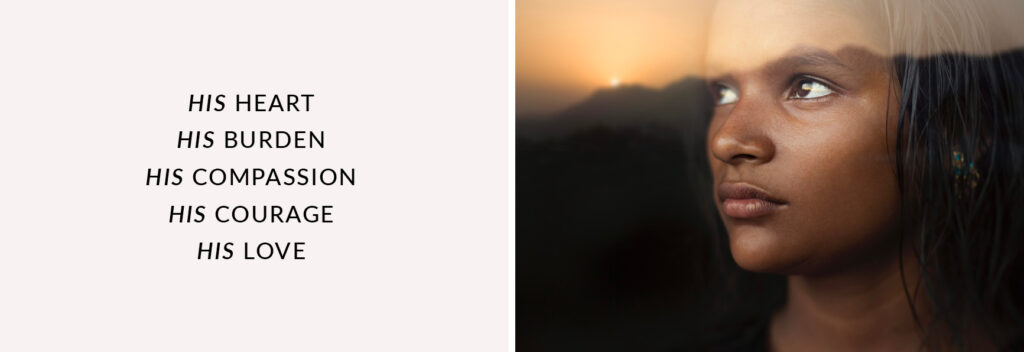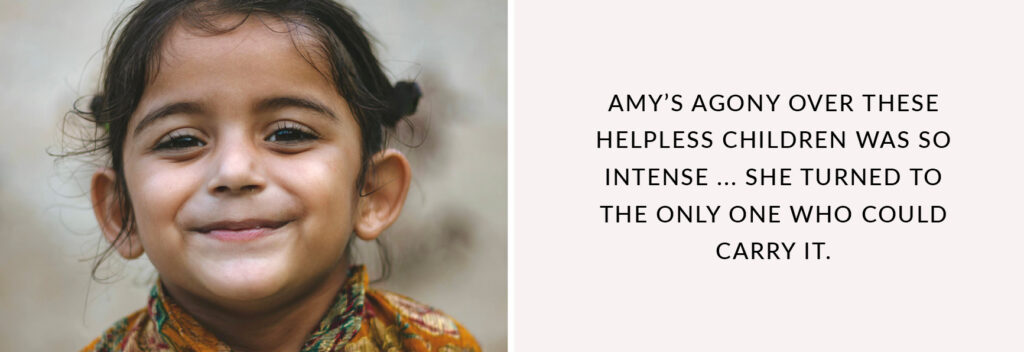Courageous Inspiration from Amy Carmichael’s Astounding Rescue Work
By Leslie Ludy

“The child told us things that darkened the sunlight. It was impossible to forget those things. Wherever we went after that day we were constrained to gather facts about what appeared a great secret traffic in the souls and bodies of young children … The things we saw haunted us. They are endurable now only because, as time goes on, something is being done towards their ending, and because of the certainty of their utter annihilation at the coming of the King of Righteousness.”
Amy Carmichael, Gold Cord
“Because I delivered the poor who cried out, the fatherless
and the one who had no helper…”
Job 29:12
A night that changed our future
When our first child, Hudson, was four years old, Eric and I had a memorable conversation with a missionary who worked in an extremely corrupt and destitute part of the world. Thousands of children were dying everyday from starvation and neglect in the country where she served. She told us about a little boy who was just about our Hudson’s age. She had seen him sitting on a dirt road, starving, hopeless, and desperate, with no one in the world to care for him. While our own son was nurtured and protected, this child was forgotten and dying. We were haunted by the mental image of that little boy, and knew there were countless more like him.
Hours later, Eric was awakened in the middle of the night, vividly picturing that helpless little boy on the other side of the world. A very clear question from the heart of God seem to present itself to his soul: “Eric, what if that were Hudson?” As a father, he immediately knew the answer. If Hudson was sitting on a dirt road on the other side of the world, starving, without anyone to help him, he would spring into immediate action. No matter what sacrifice it took, no matter how much it cost, and no matter the obstacles, he would be relentless in the pursuit to rescue his son. As he was pondering this, he sensed God speak another clear message to his soul: “Eric, that’s My Hudson.”
Eric’s father-heart broke at the thought of his little boy being in a desperate and helpless situation. And when he heard those words, “That’s My Hudson,” he gained a powerful glimpse into the Father-heart of God toward every child in need.
We had studied the statistics of vulnerable children — over 43 million orphans and over 27 million human slaves (half of them children) around the world. But now God was calling us to go beyond caring on a human level. He was asking us to adopt His heart for these little lives — not to see them as statistics, but as precious individuals that He desired to rescue. He was asking us to become His hands and feet to them. With a clear, holy trembling we said yes to that calling. We did not feel qualified, confident, or equipped — but we were willing. And our lives have never been the same since.
The Missionary Who Has Most Impacted Me
As we have sought to respond to the spiritual directive we received on that memorable night, we have experienced many heartaches and many triumphs. There has been nothing easy about the journey. But along the way, I have found tremendous strength and encouragement from studying the lives of Christians in history — those who have walked a path of God-enabled sacrifice and surrender. Our personal steps of obedience feel small and insignificant compared to the amazing lives many of these people lived — but their stories constantly remind me that they were simply ordinary men and women who trusted in an extraordinary God. And I find that fact extremely encouraging.
Of all the lives I have studied, I have been most deeply impacted by Amy Carmichael’s journey of rescuing vulnerable children in India from the horrors of child trafficking. I think it is because she was so relentless in her pursuit to “break the jaws of the evildoer and pluck the victim from his teeth” (paraphrased, see Job 29:17) — no matter what sacrifice it took, no matter what it cost, and no matter what obstacles stood in her way.
It should go without saying that Amy Carmichael, like every other notable historic Christian, was not perfect and should never be placed on a pedestal. But she demonstrated many powerful, Christlike qualities that I believe we need more of in our lives today.
I have observed two different responses that we as humans typically have when we learn about heartbreaking situations. The first response is indifference. We might feel sad when we hear about a starving child, a trafficking victim, or an eternally lost soul — but we can easily move on and become so distracted with our own lives that we never take any kind of action on their behalf. That is because we only care on a human level — and human compassion will always be curbed by self-protection and selfish pursuits.
The second response is romanticism. We might be stirred by the needs of others and decide to take action — envisioning an exciting, fulfilling, rewarding adventure in which we become an admired hero as we dramatically rescue people in need. But it does not take long to discover that there is very little romanticism or applause in true heavenly rescue work. If all we have is human motivation, we will easily give up when (not if) things become more difficult than we imagined.

But, as Eric and I learned when God said, “That’s My Hudson” — there is another way we can respond to the overwhelming needs of this broken and dying world. We can ask God to fill us with His heart, His burden, His compassion, His courage, and His love. Only then will we be truly equipped to make an eternal difference in this world. Only then will we truly become His hands and feet to those in need. Only then will we become relentless in our pursuit to rescue the weak — no matter what it takes, no matter what it costs, and no matter what obstacles stand in our way.
That is what Amy Carmichael demonstrated through her life. She became a yielded, willing vessel and allowed God to fill her with Himself, so that it was His love that moved her to do what she did. In the epic battle she was called to fight, both human compassion and starry-eyed romanticism would have utterly failed.
I will not take the time to share Amy’s entire story here, as I have written other articles about her life and ministry. But I would like to specifically highlight her advocacy work with child trafficking victims, and share some of the key spiritual principles that I believe each of us can apply to our own life today — even though our specific calling may be far different from hers.
When Amy went to India as a missionary in the early 1900s, she did not go with the intent to rescue children from trafficking. In fact, like most missionaries, she was not even aware of the dark network of secret child-trafficking in India until she had been in the country for some time. Even then, it was through a God-ordained event that her eyes were opened.
A seven-year-old girl who had been sold into trafficking by her mother had heard of Amy and decided to seek help from her, since she had nowhere else to turn. She narrowly escaped from her traffickers and found Amy through a series of miracles, and Amy offered her refuge. This child told Amy things which “darkened the sunlight,” and from that day on, Amy and her fellow workers were diligent in seeking out the truth about trafficking in India.
But she soon found that it was almost impossible to learn anything about this underground world of darkness, let alone do anything to stop it. She described those early years of diligently searching out the truth about child trafficking with extremely discouraging results:
We discovered nothing by asking questions. To ask was to close every door. To be foreign in dress, food, or ways would have been to lock those doors, the only doors to knowledge. We learned by quietly sharing as much as we could in the life of the people. The thing we wanted to do seemed impossible. It was all disappointment, and never a little one saved. But is it in vain, says the old Tamil proverb, if the heart of God’s servants burn and smote? No, it cannot be in vain.
After so many fruitless attempts to reach these children, most people would have given up. After all, she had already saved one little girl from the horrible fate of lifelong slavery, and she was active in other valuable missionary work.
But Amy had adopted God’s burden for these lost children, and she couldn’t ignore their need. His heart was breaking for them, and so her heart was breaking for them. Well-meaning friends tried to help take her mind off this cause that seemed so hopeless, but she could not forget the helpless trafficked children that were all around her but just out of reach. She wrote,
People in their kindness used to try to distract us from this that could not be forgotten. To be with them, hearing their talk … looking at their pleasant things, was like being in some clean green field full of blessed flowers. But every now and then the field would fall in and uncover a vault below; and in the vault chains and darkness and the souls of young children. The desertion of the children who had no deliverer, the wrong that we could not redress, the fear, the cold deadness of forced sin … how [do I] write anguish? It can only be felt.

Amy’s agony over these helpless children was so intense that she knew she could never carry the burden on her own. So she turned to the only One who could carry it. She wrote,
At last a day came when the burden grew too heavy for me … and I knew it was His burden, not mine. It was He who was asking me to share it with Him, now I was asking Him to share it with me. After that there was only one thing to do: who could have done anything but go into the garden and kneel down beside Him under the olive trees?
Through this wrestling prayer, a willingness to share Christ’s burdens, and a supernatural determination to move forward with unwavering diligence, Amy “searched out the cause that she did not know” (paraphrased, see Job 29:16) until the closed door of child trafficking in South India opened just enough for her to grasp the facts and begin helping some of the victims. Baby girls in that part of India were often “dedicated” to a Hindu temple, usually because the parents had a financial need or believed they would have favor with the Hindu gods if they gave their child to the temple. These babies grew up as lifelong victims of abuse and forced prostitution, with no chance of escape. Amy’s aim was to rescue these children before they were given to the temples. But the odds were stacked against her. She wrote,
Children are dedicated to the temple because of a vow, or in obedience to a family custom, or in order to escape from some social entanglement caused, for example, an out of caste alliance. Often a poor widow or a deserted wife of a good family, faced with the impossibility of marrying her child suitably, marries her to the god. Sometimes lack of money to perform the death ceremonies required by the caste tempts a mother to part with her child for her husband’s sake.
Everywhere there are men and women on the watch for these children. The sale of a child is illegal, but money is not passed in public, and the necessary proof cannot be obtained. The woman who buys the child calls it her own daughter and can easily get witnesses to prove the relationship. We have rarely known a temple woman to adopt only one child. Most have several, and there were thousands of temple women in this single Presidency. It was (and it is) an overwhelming thought.
Attempting to rescue these children was extremely dangerous work. The temple workers were ruthless in their pursuit of these baby girls and, fueled by the powers of evil, were ready to silence anyone who stood in their way. Amy described one encounter with a man involved in selling children to the temple:
One night … we found ourselves in the presence of one of the men who controlled this secret traffic. Half animal, half demon, not a man at all, he sat, a coiled mass of naked flesh, in a huge armchair, watching us with snakelike eyes, and waiting in silence for us to speak. The window-shutters of that upper room were closed, though the night was hot; the room was full of sickly fumes; a yellow flame flickered in a corner. It was an evil room. We could not speak, but turned defeated and, climbing down the steep and slimy stairs, escaped into the cleaner air of the street.
This was merely a glimpse of the evil she was up against. After all that she had seen and learned about this secret world, there was no way she could remain indifferent to the children who were helplessly in their clutches. And there was certainly no way she could romanticize the rescue of these children. She could only share the burden Christ had asked her to share, and become His hands and feet to them as He infused her with His enabling grace. His relentless love flowed through her and was far stronger than the forces that tried to oppose her.

Not only were the demonically-inspired traffickers standing against Amy, but even well-meaning Christians and friends seemed to stand in her way. Some felt she should not meddle in the customs of a nation that was not her own, others felt she was being unrealistic and foolish to think she could make any difference, and still others were sympathetic but unwilling to help to the point of self-sacrifice.
Elisabeth Elliot described the resistance Amy experienced from other missionaries when she was first beginning this unusual rescue work, not only because of the work she was doing, but also because of her high standards and set apart lifestyle:
There arose during the early years of [Amy’s ministry] work a fairly strong “Get-Amy-Carmichael-Out-of-India” movement among missionaries and Indian Christians. She was a thorn in their sides. Why must she insist on doing the unacceptable? … When it came to a choice between the good will of the missionaries in South India (and Christians elsewhere) and obedience, there could be no hesitation. She would resolutely follow the Master who knew all about misunderstanding.
No matter the opposition or discouragement, Amy continued her dogged pursuit to rescue children in danger. Through a series of miracles, babies began to be rescued and spared from lives of horror and hopelessness. And yet, even after the babies came, she had very little support with many discouragements and setbacks along the way. A letter from an experienced Christian missionary friend described the spiritual battle well:
You are fighting Satan at a point upon which he is very sensitive; he will not leave you long in peace.
And he did not leave her in peace. Intense attacks came again and again, including several deadly sicknesses that resulted in the tragic deaths of many babies she had worked so hard to save.
But Amy’s attitude was simply this:
[Our missionary work] was to develop upon lines that would not find general acceptance, and we had to learn the unchangeable truth: Our Master has never promised us success. He demands obedience. He expects faithfulness. Results are His concern, not ours. And our reputation is of no consequence at all.
Not only did Amy risk her health, safety, and reputation to save baby girls (and later young boys) from forced temple prostitution, she also determined to bring them up as mighty daughters of the King— introducing them to truth at a very young age and raising them to be set apart for Jesus. This meant relying on God for provision and protection, as well as for co-workers to help her in the never-ending work of child-raising. Especially in the early days, it was extremely rare to find co-workers who would help raise these children, because it was not considered important or worthwhile work for missionaries. Amy wrote,
When we were an Itinerant Band [i.e. going on evangelistic outreaches], we had many offers from Christian girls and women to join us, as many in one month as we now have in five years. Sometimes it has seemed to us that we were set to learn and teach a new and difficult lesson — the sacredness of the commonplace … The enlightening of a dark soul or the lighting of a kitchen fire, it matters not which it is, if only we are obedient to the heavenly vision, and work with a pure intention to the glory of God.
Amy lived this out beautifully. Though she could have been successful from a human standpoint and gained accolades within the Christian world, she chose to be disregarded and misunderstood, for the sake of the One who had left everything to redeem her. She wrote,
Is it the bondservant’s business to say which work is large and which is small, which unimportant and which worth doing? The question answered itself and was not asked again. It was a foolish question, for the Master never wastes the servant’s time.
And God did not waste Amy’s time. Her relentless love was not in vain. She served in India for 56 years (until her death) rescuing and raising hundreds of children and leaving a spiritual legacy that continues even today. Her life proves that, no matter the obstacles and setbacks, heavenly love — Christ’s love — is always victorious.

Quotes taken from:
Amy Carmichael, Gold Cord: The Story of a Fellowship (CLC Publications: Kindle Edition, 2013)
Amy Carmichael, Lotus Buds, (Amazon Digital Services: Kindle Edition, 2011)
Elisabeth Elliot, A Chance to Die, (Revell: Kindle Edition, 2021)
This article was originally published in Issue 46.
For more content, explore our article collection.